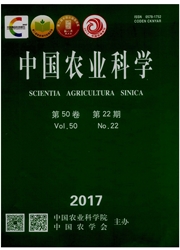

 中文摘要:
中文摘要:
【目的】探讨柔嫩艾美耳球虫(Eimeria tenella)入侵细胞与钙信号转导之间的关系,揭示鸡柔嫩艾美耳球虫病的发生机制。[方法]采用体外狗肾细胞(madin-darby canine kidneycell,MOCK细胞)培养技术,检测了细胞外缺钙、Ca2+内流阻断剂(硝苯地平)和钙调蛋白抑制剂(三氟拉嗪)对E.tenella子孢子入侵率的影响,并测定了培养细胞上清液中乳酸脱氢酶(LDH)和细胞活性。【结果】E.tenella子孢子入侵细胞的抑制率随着细胞外Ca2+浓度的降低而升高。钙离子浓度降低到600umol·L-1时,入侵率(23.33%)均极显著低于对照组(P〈0.01);细胞外无钙时,入侵抑制率高达53.18%;硝苯地平和三氟拉嗪均能极显著抑制子孢子的入侵(P〈0.01),其中10umol·L-1的硝苯地平和50umol·L-1三氟拉嗪分别对子孢子的入侵抑制率达71.41%和97.13%,二者合用入侵抑制率可达98.59%。在E.tenella子孢子入侵细胞的过程中,MDCK细胞的活性均在90%以上,与对照组差异不显著(P〉0.05),接种最tenella子孢子的MOCK细胞培养液中LDH的活性与未接种的活性差异不显著(P〉0.05)。【结论】细胞外钙缺乏、钙通道阻断剂硝苯地平和钙调蛋白抑制剂三氟拉嗪对E.tenella子孢子入侵MOCK细胞均有抑制作用,但子孢子入侵对MDCK细胞的活性无明显影响。
 英文摘要:
英文摘要:
[Objective] The objective of the study is to investigate the relationship between Ca2+ signal transduction and Eimeria tenella sporozoite invasion, and to reveal the mechanism of coccidiosis (E. tenella). [ Method ] An assay system in vitro was used to study the effects of E. tenella sporozoites invasion into MDCK cell by extracellular Ca2+ deficiency or Ca2+ inflow blocker (nifedipine) or calmodulin inhibitor (trifluoperazine). Viability of MDCK cells and lactate dehydrogenase in supernatant liquid was examined. [Result] The inhibition rate of E. tenella sporozoite invasion increased with the decrease of the Ca2+ concentration. At low Ca2+ concentration of 600 umol.L-1, the rate ofE. tenella sporozoite invasion (23.33%) was significantly (P〈 0.01) lower than that of the control group. When extracellular environment was absent of Ca2+ absolutely, the inhibition rate rose to 53.18%. Either nifedipine or trifluoperazine could inhibit the E. tenella sporozoite invasion obviously (P〈0.01), the inhibition rate of 71.41% and 97.13% were achieved by 10 umol·L-1 nifedipine and 50 umol·L-1 trifluoperazine, respectively. The inhibition rate of 98.59% was reached by nifedipine and trifluoperazine together. The viability of MDCK cells with E. tenella sporozoite invasion exceeded 90%, and the data was not remarkably different compared with the control group (P〉0.05). The same is as the viability of lactate dehydrogenase in supernatant liquid. [Conclusion] Extracellular Ca2+ deficiency, calciumion inflow blocker (nifedipine) and calmodulin inhibitor (trifluoperazine) could inhibit the E. tenella sporozoite invasion of MDCK cells. The host cell activity was not affected by E. tenella sporozoite invasion.
 同期刊论文项目
同期刊论文项目
 同项目期刊论文
同项目期刊论文
 期刊信息
期刊信息
